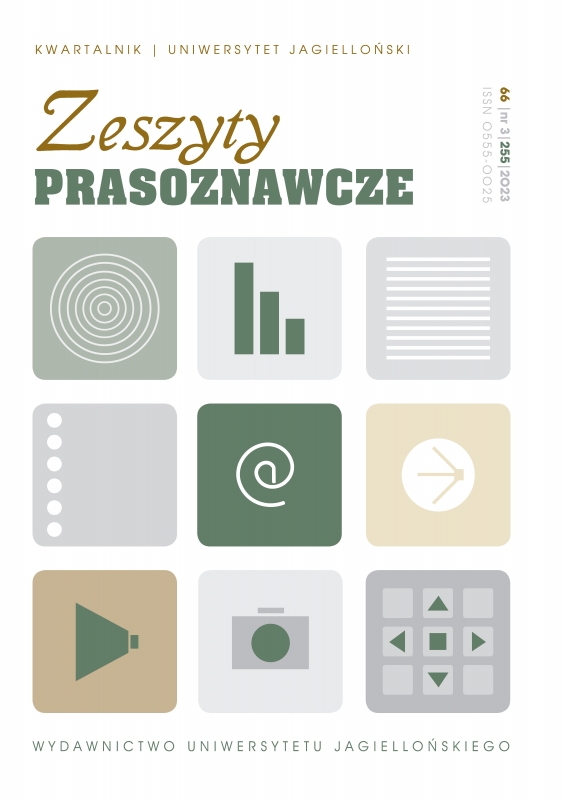
We kindly inform you that, as long as the subject affiliation of our 300.000+ articles is in progress, you might get unsufficient or no results on your third level or second level search. In this case, please broaden your search criteria.


Political communication is the process of exchanging political messages between political actors and citizens thanks to the available communication channels. The first scientific research appeared before World War II in Anglo‑Saxon countries. The development took place in the late 1960s. The leading topics are: political actors and their activities (election campaigns, political marketing, public relations, advertising), voters, mass and social media. The research dedicated to political communication in Poland began in the 1990s at the universities, mainly in Katowice, Krakow, Lublin, Poznan, Warsaw and Wroclaw.
More...
The aim of the article is to analyze the achievements of Krakow researchers associated with the Institute of Journalism, Media and Social Communication of the Jagiellonian University from the historical perspective of the development of research on political communication in Poland. The authors present research traditions derived from the legacy of the Press Research Center and scientific discussions published in Zeszyty Prasoznawcze, indicate key authors whose works have contributed to expanding the field and research perspective of political communication as a sub-discipline of communication science and map the current spectrum of their interests and methodology used by them based on the literature review.
More...
New opportunities for creating and exchanging messages between political actors, the media and the audience/voters are to some extent the effect of the dynamically developing technological sphere. The advent of online media (including social media) has changed politics. At the same time, political communication is also changing. On the one hand, this is an inspiration and, on the other hand, a challenge for the scientific exploration of this research area. The interdisciplinarity of media science, which includes the study of political communication, prompts researchers to look for new research tools, especially in the field of data collection, analysis and visualisation. This leads to the incorporation of previously non-specific methods into the field of media studies. The aim of the article is to present social network analysis (SNA) as a method popular in American and European research, although still rarely present in Polish analyses of political communication. The article presents the characteristics of the method, its main indicators and the current state of research in Poland.
More...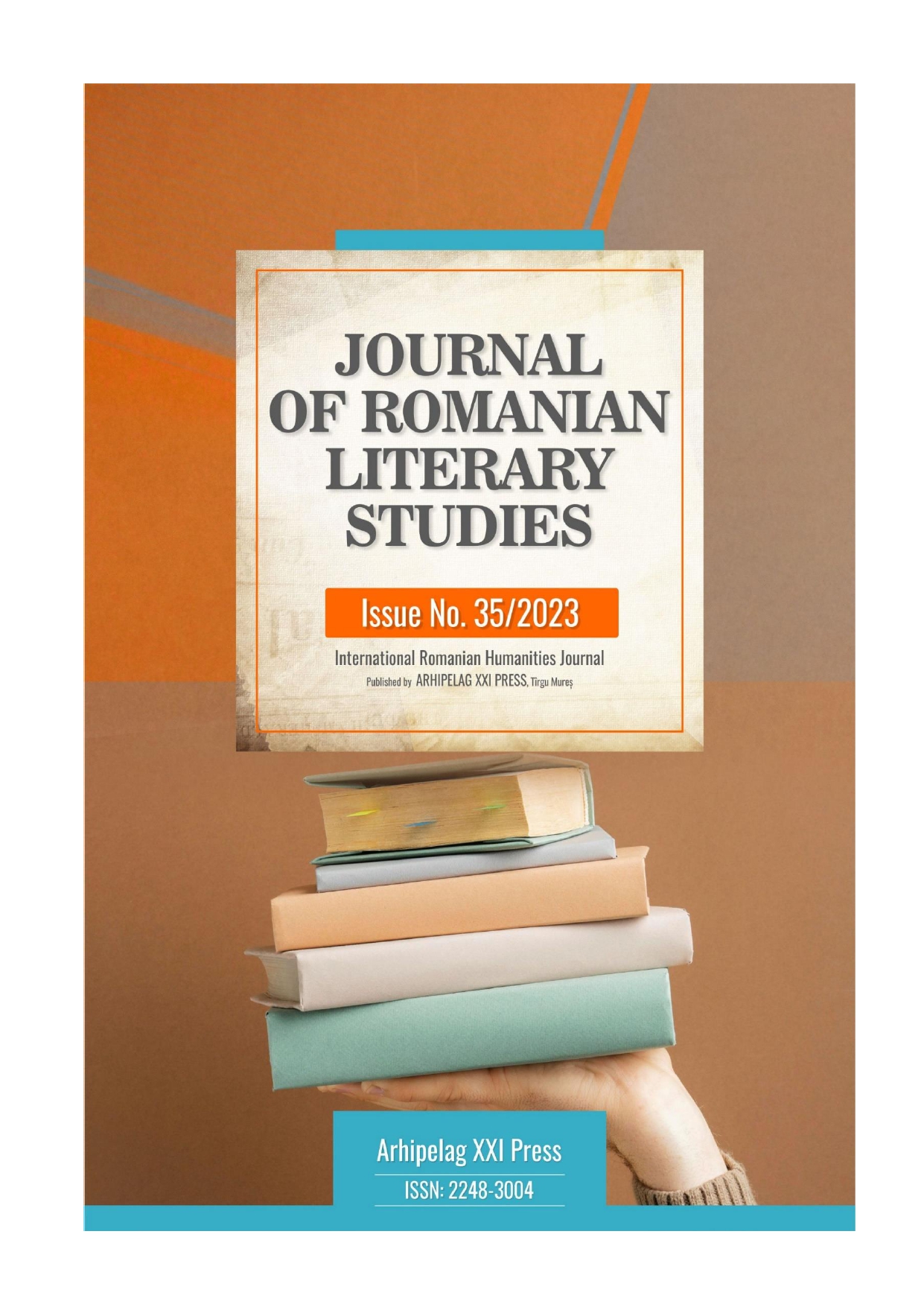
The present paper is probing the aspects that defined the German influence in Croatia, capturing some of the results of the subordinate politics in all aspects of the Reich and Italy. The Italian and German profiles governed the balancing policy of Croatia in favour of Germany for breaking away from the Italian friendship. Romania placed its destinies alongside Germany, these aspects being followed from the Romanian-German collaborations imposed by pacts, treaties, understandings and orientations within the Axis towards states that sought their covery of the territories taken over by Hungary in 1940.
More...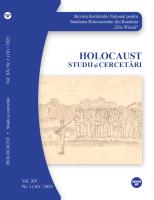
A.C. Cuza was a prominent antisemite politician. In the latter half of the interwar period, he realized that his movement could become more influent in the new context, after Adolf Hitler’s advent to power, when other countries also resorted to dictatorial or totalitarian regimes. He tried to use his presence in the Romanian Parliament as a springboard to gain votes and to convince the constitutional factor, King Carol II, that he was leading a popular movement and could be entrusted with government. However, he remained the same mono-thematic antisemite, incapable to come up with something new, including in antisemitism. He was not capable to propose a more complex understanding of the Romanian society’s problems and, as a consequence, was surpassed in influence by the Iron Guard.
More...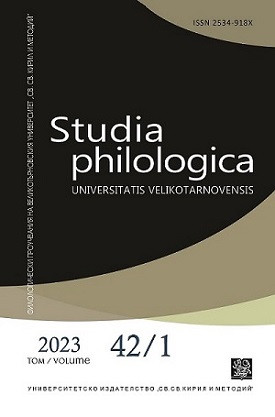
This article aims at analysing the cognitive and pragmatic aspects of metaphors in the inauguration speech of the Spanish Presidente del Gobierno Adolfo Suárez, in Spain’s first constitutional government. The paper will uses a multi-disciplinary approach and relies on Lakoff and Johnson’s Conceptual Metaphor Theory, Charteris-Black’s Critical Metaphor Analysis, Teun Van Dijk’s context model theory, as well as on other pragmatic concepts that contribute to assessing the coherence and cohesion of the text. This qualitative approach intends to look for the presence of metaphors and conceptual metaphors in the speech, while attempting to identify the pragmatic strategies behind them.
More...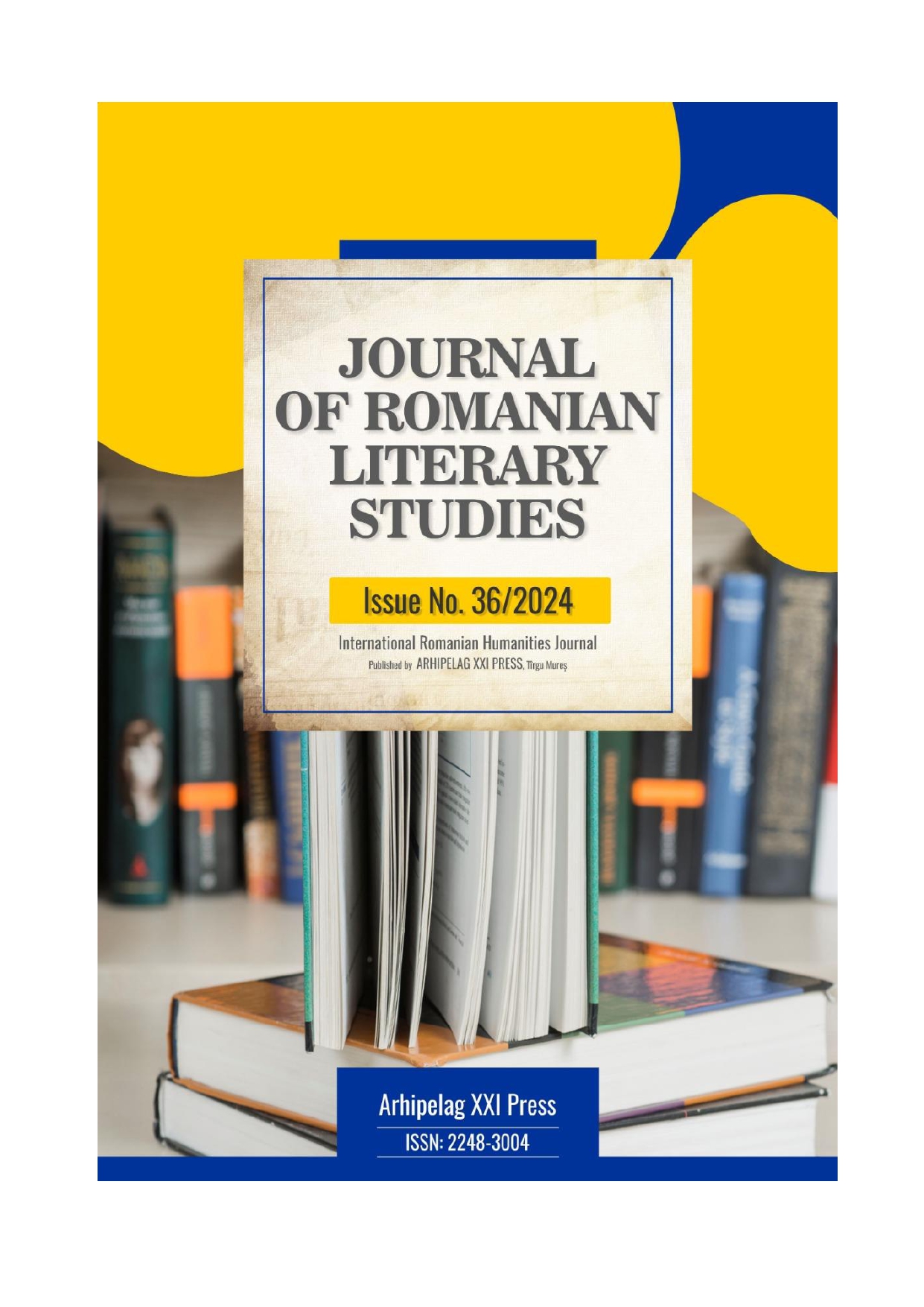
This study aims to analyze the visits that the Romanian Minister of Foreign Affairs, Corneliu Mănescu, made to Morocco, Algeria and Tunisia. In that year, the Romanian official became known worldwide due to the fact that he was then elected president of the UN General Assembly. Thus, he was invited to visit many countries, but he was not able to honor them all. The three states were selected because, at that time, their relations with Romania were on the rise. It was initially proposed that these visits be included in a tour, but Algeria objected because they were not on good terms with Morocco. In the article we will study how these visits were prepared, their schedule and the discussions that Mănescu had with the leaders and other officials of those states. The receptions worthy of a real head of state that Mănescu received in Morocco and Tunisia will also be presented, as several protocol norms were broken. It will also be analyzed how these events were propagandistically speculated by the Romanian communist press.
More...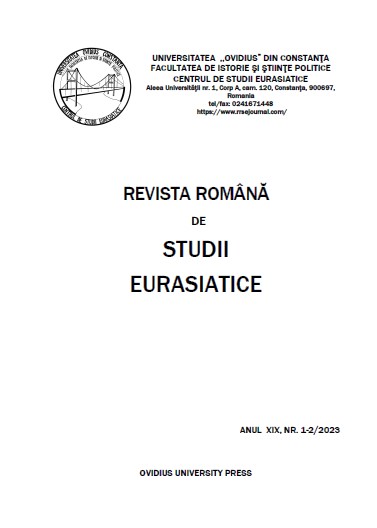
The word "war” carries a strong nominal charge in several types of wars and several ways of waging them: war of position, economic war, atomic war, cold war, diffuse war, war against a pandemic, etc. This article takes us through a brief history of the recent war in images, as it has been taken up by social media, through several characters who have turned their current (and) current activity into a weapon of war: a war of images and social media. The approximation of what is personal or identity in social media and the politics of war represents a major shift brought about by recent, bloody events. About the self and politics, about images and the power of messaging, about language in the service of war on social media, a search for personal as well as national identity, these are the new issues brought to the agenda of the day through social media. The President of Ukraine himself, Volodymyr Zelenskyy, has started using social media relentlessly to get his anti-Russian message out to the world. This foray into social media, politics, identity, and language is one of the weapons of war and it should not be avoided, on the contrary, it should be seen, supported, and recorded in history.
More...
At the beginning of the twentieth century, the Kingdom of Romania found again the moment to approach the Russian Empire, which was now in an alliance with France and then with England. Romanians began to overcome the injustices done in the past, realizing that the only chance to fulfill the national ideal (a possible union of Transylvania and Bukovina with the Kingdom of Romania) could be done with the help of Imperial Russia. A special episode that improved the diplomatic relations between the Kingdom of Romania and the Russian Empire was the visit of Tsar Nicholas the Second in Constanta on June 1st, 1914. On the occasion of this visit, the royal family of Romania aimed for a potential marriage between Prince Carol, the son of Prince Ferdinand and Princess Maria and the grand duchess Olga Nikolaevna, one of Tsar Nicholas's daughters. This event would also have an important role in the subsequent decision of the Kingdom of Romania to enter the war that was just about to begin.
More...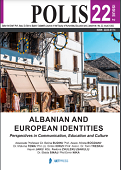
Purpose: This study investigates the challenges that Albania faces in economic development, social changes, and media transparency in a democratic, postcommunist society. The analysis draws on contemporary historical sources, human rights reports, academic studies, news articles, and official governmental and nongovernmental publications, correlating these findings with Albania’s journey towards democratization. Findings: The essay identifies the economic repercussions of communist governance, including prevalent unemployment and fragile market structures. It explores the social impact, linking them to issues like suppression, fear, and weakened trust in the contemporary government. Originality/Value: This article provides an analysis of the challenges in postcommunist Albania, focusing on social and economic developments and media coverage. It suggests targeted strategies for the government to strengthen democratic institutions.
More...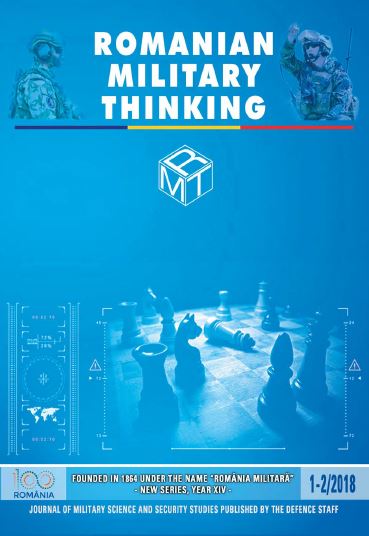
The unification of Basarabia with Romania led to increasing anti-Romanian propaganda carried out by the internal and external forces that opposed to the decision democratically adopted by the legitimate representatives of the inhabitants of Basarabia at 27 March/9 April 1918. Agents from the East or among the local population tried to lead Basarabians into believing that the Romanian authorities opposed the reforms, especially the agrarian reform and the universal suffrage. The leaders of the Basarabian Romanians and the civil and military representatives of the Romanian state made significant efforts to eliminate the effects of the anti-Romanian propaganda theses. Unfortunately, many of these theses are still used today in the media and online, highlighting the negative aspects of the Romanian presence in Basarabia at that time and deliberately ignoring the martyrdom of the Romanians from Basarabia during the Soviet occupations.
More...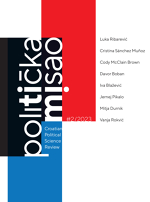
Review of: Mykola Davydiuk, Як працює путінська пропаганда? (How Does Putin’s propaganda work?) Smoloskyp, 2019, 208 pp.
More...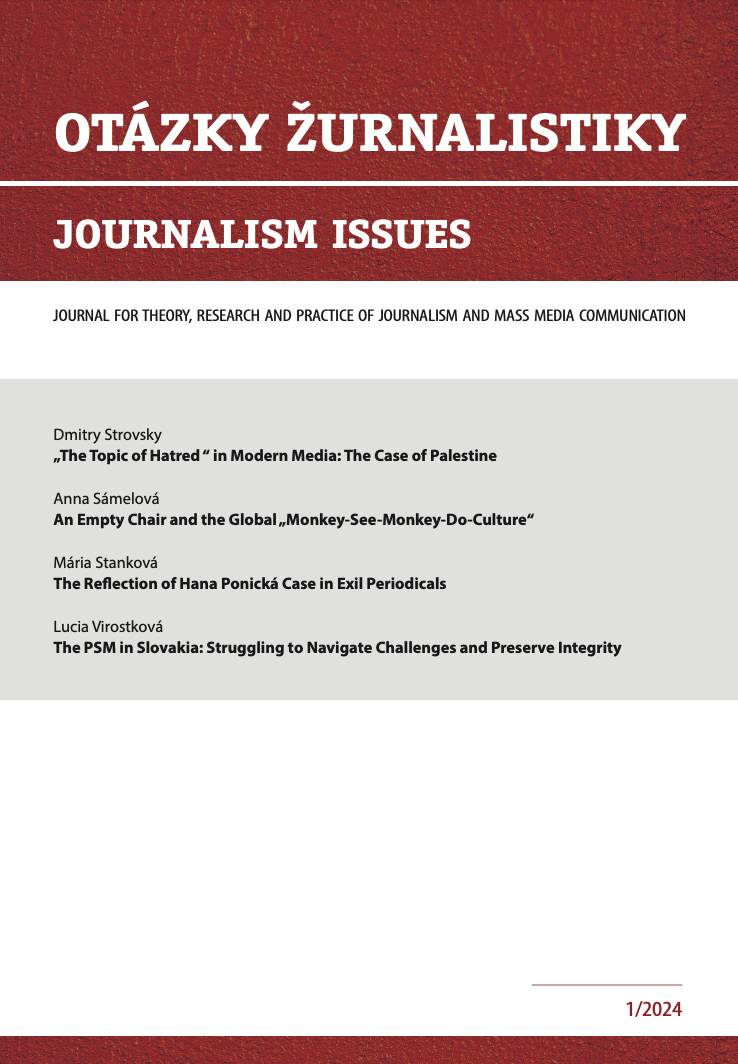
The dramaturgy of an empty chair in a radio or television debate is a rare phenomenon in Slovakia. Despite this, Slovak journalism theorists and practitioners are increasingly encountering the scandalization of this symbolic editorial procedure by laymen. The interpretation of some politicians that an empty chair is censorship is particularly dangerous. The aim of this theoretical study is therefore to clarify what the empty chair institute is, when and how it can be applied, when and how it may not be applied, how it is related to the process of mediatization of the world and culture, why it has become an object of politicization, and how it is connected with the global “monkey-see-monkey-do-culture”.
More...
This article examines the evolving narratives of the German political party Alternative for Germany (AfD) and its potential as a hybrid threat. Through narrative manipulation, the AfD has demonstrated its ability to influence public discourse and distort reality via disinformation dissemination. The AfD established in 2013 in response to the financial crisis and dissatisfaction with the European Union, has transitioned into a populist party, and along with this change, it has also changed its narrative. This shift was notably evident during the migrant crisis in 2015, showcasing the party's adeptness at evoking fear and animosity among German voters. The AfD's narratives have been for years similar to those of the Russian Federation, which has used almost identical narratives on some topics. The German party is consequently working with Russian politicians to reshape democratic politics within Europe, and the AfD is accordingly acting as a hybrid threat to the entire European Union. The study is based on a discourse analysis of interviews conducted with German experts on the topic as well as a content analysis of selected German media to explore these narrative dynamics and their broader implications.
More...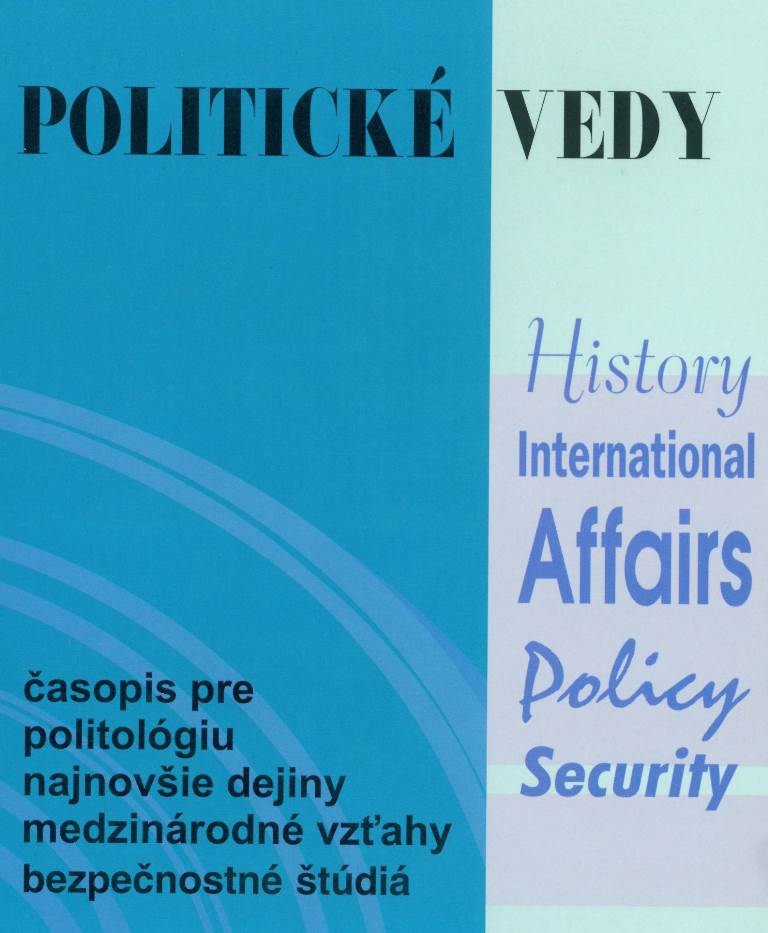
Terrorism has been often considered to be a subjective label rather than a distinct form of violence. Discourse has played an important role in creating the threat of terrorism, as well as in the legitimisation of counterterrorism level. The importance of studying discourse can thus no longer be denied. This article analysed the character of official discourse on terrorism delivered by Australian prime ministers between 9/11 and the end of 2019, since Australia is one of the countries involved in the War on Terror. The author used the NVivo software to analyse speeches delivered by John Howard, Kevin Rudd, Julia Gillard, Tony Abbott, Scott Morrison, and Malcolm Turnbull. She applies Norman Fairclough’s three-level Critical Discourse Analysis to study the character of the speeches, positive and negative emotions which were invoked by the speeches and the connections that were drawn to other discourses. She also analyses the context in which the speeches were delivered as well as the adopted counterterrorism measures that were legitimized in the speeches. The results of the analysis demonstrated that all Australian prime ministers used the terrorism label to some extent, however each of them delivered speeches on terrorism that had a different character. All of the analysed prime ministers, with the exception of Kevin Rudd, also presented emotional discourse on terrorism. The article demonstrates how is the terrorism label portrayed differently by each speaker, and that not all discourse on terrorism has to necessarily be emotional.
More...
The study focused on the phenomenon of political marketing, political communication, and their application in world politics during the post-truth era with an emphasis on the territory of the United States of America. The aim of the study was to identify several aspects of these disciplines during the dynamic technological progress which makes it possible to develop misleading manipulative techniques and spread disinformation. The emerging issues of the current state of the online sphere such as abuse of personal data for one's own political gain, dissemination of false news that radicalizes the public and threats to the security of free and fair elections and a democracy relate to other concerns such as a polarized society and electoral integrity. Politics has always been, and will continue to be, an infinite number of shades of grey. Absolute honesty and elimination of negative advertising or propaganda is neither realistic nor desirable, though we consider it important to strive for more ethical election campaigns. The conclusion of this article can be applied to other studies that will continue the research on the given topic and will respond to the current challenges of democracy.
More...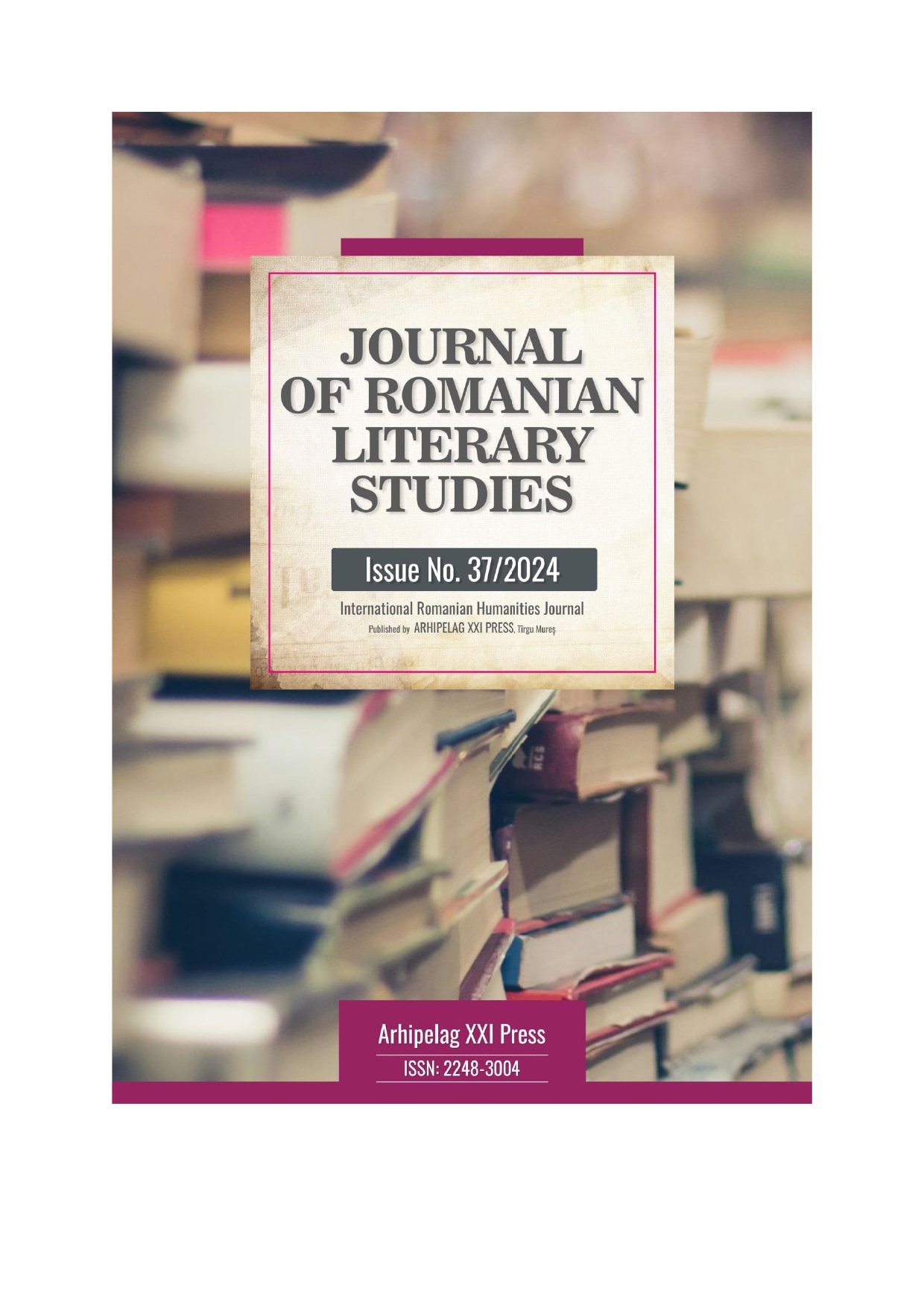
Alexandru Lahovari's success, as a politician and statesman, is undoubtedly due to his exceptional oratorical talent, along with his solid culture, his passionate nature, with his measure and spirit of justice, and, as with all great orators, his faith strong in the truth and justice of her words, which, as a rule, she managed to convey to the audience as well. Listening to Alexandru Lahovary when he spoke, you thought that there were two personalities in him: one that spoke to the mind; it was his mind. Another that went to the heart was his warm and sincere passion. This is why in his speech as in his deed he was both measured and vehement, both respectful and mocking, both logical and enthusiastic. His pressed word, united with the decisive gesture and the persuasive look, gave his reasoning even greater power. In the political order, there was no freedom that Lahovari did not defend, no national interest that he did not support. Going through any of Alexandru Lahovari's speeches, you get the interesting impression that he is (almost) always right and, transposing yourself in time, with an effort of imagination, over a century back, you are with him, you feel how he convinces you in most cases, even if you belong to another era and even if you have, perhaps, other political beliefs, what does this secret consist of? Precisely in Lahovari's art of oratory, comparable, we think, with that of your Mihail Kogălniceanu or that of Nicolae Titulescu. But let's see what his contemporaries thought about the great conservative politician.
More...
After the double election of Alexandru Ioan Cuza, on January 5 and 24, 1859, the Romanian political class was preoccupied with the international recognition of the new ruler and the perfection of administrative unity. All these efforts were supported by the activity of Romania's diplomatic agents in the French capital, the creation of the Agency itself representing a symbol of independence. The Agency of the United Principalities in Paris was officially recognized on August 26 / September 7, 1860, after Ioan Alecsandri (the first holder of the Agency) presented the letters of accreditation to the French Foreign Minister, Edouard Thouvenel, thus obtaining the right to use the cipher in his correspondence. Apart from Constantinople, where the existence of an Agency was provided for in the Paris Convention, during Cuza's reign, Agencies were established in Paris and Belgrade. In 1880, the Romanian Diplomatic Agency in Paris was transformed into the Romanian Legation in Paris, as a result of gaining state independence.
More...
The past two decades are reviewed to see how transparent donors have been and how it has impacted their partnership with recipient nations in Africa. Their partnership plays an essential role in how aid is implemented. Corruption in resource-rich African countries is often linked to transparency and accountability. There has been an ongoing development process to lift living standards across the continent for decades. This paper examines the role of donors in promoting or preventing transparency in aid-dependent countries. It finds that while donor efforts have been significant, they often face limitations due to local context and lack of transparency. The donor-recipient relationship's power imbalance is a significant factor in aid effectiveness. Donors can influence projects and impose conditions, but recipient countries lack ownership. This imbalance can lead to disappointing or sustainable aid outcomes. This paper investigates the governance gap and the relationship between good governance, accountability, and transparency of donors. One of the most important areas in which to increase aid is transparency in operations. An index is provided to evaluate and classify donors according to the transparency of their aid efforts through ranking and assessing donors' transparency in aid delivery. This is done by providing a comprehensive understanding, which can enhance transparency research in recipient countries when combined with conceptualization and operationalization.
More...